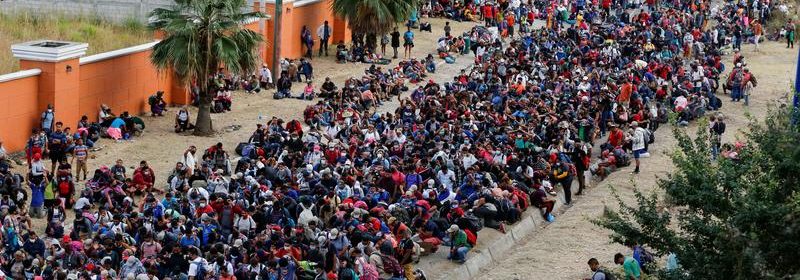'We're starving': U.S.-bound migrant caravan hunkers down after Guatemala crackdown

VADO HONDO, Guatemala (Reuters) – Hundreds of Honduran migrants huddled overnight on a highway in eastern Guatemala after domestic security forces used sticks and tear gas to halt the passage of a U.S.-bound caravan just days before U.S. President-elect Joe Biden takes office.
As many as 8,000 migrants, including families with young children, have entered Guatemala since Friday, authorities say, fleeing poverty and lawlessness in a region rocked by the coronavirus pandemic and back-to-back hurricanes in November.
“There’s no food or water, and there are thousands of children, pregnant women, babies, and they don’t want to let us pass,” said a Honduran stuck at the blockade, who gave his name only as Pedro.
Guatemalan authorities say they have sent hundreds of migrants back to Honduras.
A Reuters witness said about 2,000 migrants were still camped out on the highway near the village of Vado Hondo, about 55 km (34 miles) from the borders of Honduras and El Salvador, after clashing with Guatemalan security forces on Sunday.
“We’re starving,” said one Honduran mother, stuck behind the cordon with her 15-year-old son, her daughter, 9, and her 4-year-old niece.
“All we have is water and a few cookies,” said the woman, who declined to give her name, but added that she and other travelers had formed a prayer circle as they camped out.
Other migrants evaded the gridlock by fleeing into the hills to continue onward to the border of Mexico, where the government has deployed police and National Guard troopers.
“We ran into the mountains because I’m traveling with my one-year-old,” said Diany Deras, another Honduran.
Mexico’s border with Guatemala was quiet.
“All is calm here,” said a National Guardsman in charge of a border crossing directly opposite Tecun Uman, Guatemala, where caravan leaders hope to cross into Mexico. He sought anonymity as he was not authorized to speak to media.
“I hope Guatemala contains them,” he added.
Source: Read Full Article
